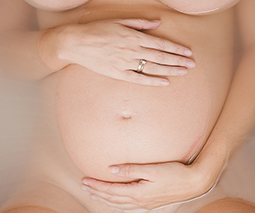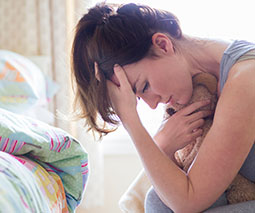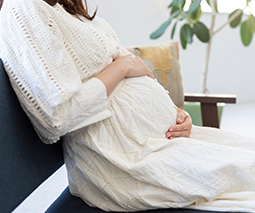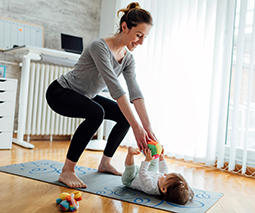When it’s MORE than ‘morning sickness’: The facts on hyperemesis gravidarum

Every newly pregnant woman knows that they may suffer from what’s known as ‘morning sickness‘ at certain times in their pregnancy. And for most preggy mamas, its name is indicative of the issue – it happens mostly in the morning and lasts for a few weeks during the first trimester, sometimes manifesting again during the third trimester.
But for many women, it can last much longer and even affect them throughout their entire pregnancy.
When morning sickness becomes more than the expected nausea and occasional morning vomit, and the sickness overwhelms you every day making it hard to keep food and drink down, you may actually be suffering from severe pregnancy sickness – known as hyperemesis gravidarum.
What is hyperemesis gravidarum?
Hyperemesis gravidarum (HG) is a pregnancy condition that causes severe nausea and vomiting, weight loss and an imbalance of the body’s electrolytes.
While 70-80 percent of women experience some type of morning sickness during pregnancy, a diagnosis of HG is unusual, with an estimated 0.3 – 1.5 percent of pregnant women suffering from the condition.
Mild cases of hyperemesis gravidarum can usually be managed with rest, changes to the diet and antacids. More severe cases, however, can require hospitalisation to manage dehydration (as it did with me). Doctors may prescribe pregnancy-safe anti-nausea medications and while these are effective for some women, they aren’t a cure-all and can be extremely expensive.
What causes hyperemesis gravidarum?
HG is believed to be caused by the rise in hormone levels associated with pregnancy, with symptoms usually appearing early in pregnancy – around 4-6 weeks – and peaking around 9-13 weeks. While most women find the symptoms ease after 20 weeks, some unlucky women suffer from hyperemesis gravidarum right up until they give birth.
What’s the difference between morning sickness and HG?
The main markers for a hyperemesis gravidarum diagnosis are:
- Nausea accompanied by severe vomiting
- Constant nausea that doesn’t subside
- Dehydration caused by severe vomiting
- Vomiting that prevents you from keeping any food down
- Weight loss of 5 percent or more of your pre-pregnancy weight
Surviving hyperemesis gravidarum when you have older kids to consider
Unfortunately for us HG sufferers, there is rarely an end in sight until our baby is in our arms. And it’s especially difficult to cope when you also have older children to care for.
Here’s what I’ve learned from my double trip through the trenches – especially how to cope with the kids you already have when you’re feeling so awful.

1. Stay hydrated
Dehydration is a key factor with HG, and it can set in quickly when you struggle to keep any food or drinks down. Dehydration is not only dangerous for mum and baby, but it can cause symptoms like dry mouth, dizziness, headaches and muscle cramps. These symptoms not only sap your energy for dealing with your other children, it may lead to you needing to be rehydrated in hospital. So even though it’s hard to keep anything down, it’s super important to keep hydrated.
My tips for keeping some fluids down are:
- Drink tiny sips of water or fluids as often as you can stomach it – aim for a few small sips every 5-10 minutes (keeping a drink bottle at the ready is helpful).
- Avoid gulping or taking large mouthfuls – your tummy will handle small sips better.
- Keep some electrolyte ice blocks in the freezer to replace the electrolytes you lose when you vomit.
- Try sucking on ice or ice blocks.
2. Eat like your toddler
The LAST thing you want to think about when you feel like death warmed up is food! But trust me, keeping your food intake up is important for both your energy and bub’s health.
A trick I learned was to eat with my toddler – who basically didn’t stop eating all day. My little one was a grazer, so I supplied regular healthy but small snacks to keep her going through the day. These little snacks proved perfect for me – as eating too much at once was sure to have me heaving. Eating like my toddler meant I nibbled on something small but nutritious as often as I could.
3. Be clear with your partner and family about what you need
The unrelenting nausea can mean that even simple things like changing position in bed, getting up from your seat, or a turn round a corner in the car can bring on the urge to vomit. Make sure your family is aware.
Yes, you can dispense orders like the Queen of England right now. Whenever you can stay put and ask someone else to do it – my advice is STAY PUT! Delegate everything you can to friends and family. They will survive! And you will feel the urge to purge your last meal much less frequently.
4. Teach your kids to help
Further to point 3, if your kids are old enough to walk, they can be a big help, so put those kids to work, mama!
Little kids can help with things like grabbing your drink bottle or a nappy when they need a change. They can pick up toys and put them away (even if it is one at a time and takes two hours). They can choose their own clothes for the day – who cares if they’re wearing nothing but swimmers and a Batman mask? Just whack some pants on before you leave the house, and you’re set.
Older kids can help with preparing dinner, feeding pets, and all sorts of odd useful jobs around the house. Not only will they be helping you out, they’ll be learning a lot about responsibility, compassion and everything Mum usually gets done on a daily basis.

5. Accept any and all help
If a friend offers to stop by and cook your family a meal or drop your older kid/s to school, don’t feel too proud to accept, even if you’re feeling OK that day. With HG, you just never know when you’ll need to curl up into a ball for a while, and having some little things taken care of can be a huge blessing.
Grandparents, aunties, uncles and friends are a great source of help when you’re struggling. They wouldn’t offer if they didn’t want to help, and you know you’ll return the favour one day.
6. Consider daycare or a babysitter/nanny
My two-year-old daughter was already attending daycare one day a week so that I could work part-time, so when the HG hit early in my second pregnancy, this was a lifeline! As my pregnancy went on and the HG got worse, we opted to send her two days a week, simply to give me some time to rest and to make sure she got plenty of stimulation when I was unable to give her much of it myself.
I urge any mother to consider a regular babysitter, nanny or daycare during this difficult time. Not only does it give you a break, but your little one will benefit from a regular outing from the house and the social interactions and activities they’ll encounter. Plus, they’re usually so tired afterwards, you get a fairly quiet evening as well once they crash out. Bonus!
7. Pamper yourself
When you’ve been feeling so ill for so long, sometimes a little bit of pampering can brighten you up just that little bit, making it easier to cope with day-to-day life. A soothing facial, massage, or a long soak in the bath can be as good for the soul as it is for your skin and body. You deserve it – after all, you ARE growing a human here, and that sweet little human is sucking you dry of every ounce of energy.
8. Ditch the guilt
It sounds easier said than done, I know. When you feel so ill you can barely get off the couch, and every movement or bite to eat sends you dashing for a v-bag, mustering up the energy to cook a nutritious meal or take your kids to the park can seem like an insurmountable task.
It’s easy for the guilt to set in when we feel like we’re not being the best mum we can be, and I’m here to tell you to stop that right now! If you get more takeaway meals than usual, have a sinkful of dishes, and haven’t played with your kids in the backyard for a few days, give yourself permission to go easy on yourself. You really are going through one of the hardest times of your life right now, and it’s okay to focus on you and your needs.
Your kids will be fine – it’s not forever and you’ll be back on your game soon enough.
9. Remind yourself it’s not forever
I know it sounds terribly glib, but it did help me to remind myself of this small fact now and then. When every day is a struggle, it is really disheartening and overwhelming and it can send some women into an emotional spiral at a time when they should be feeling the happiest they’ve ever been.
The one thing that helped me during the darker times was reminding myself that it would all be over as soon as I had my baby in my arms. There is a (very cute and noisy) light at the end of the tunnel!
It’s not easy, mama. Even with all the tips in the world, hyperemesis gravidarum was one of the hardest things I have ever had to endure. These are just some of the things that helped me the most, and I hope they help you too.
 Need some support to be the best parent you can be? Our Parent School parent coaching experts can help. Click to find out more or book a one-on-one session.
Need some support to be the best parent you can be? Our Parent School parent coaching experts can help. Click to find out more or book a one-on-one session.













